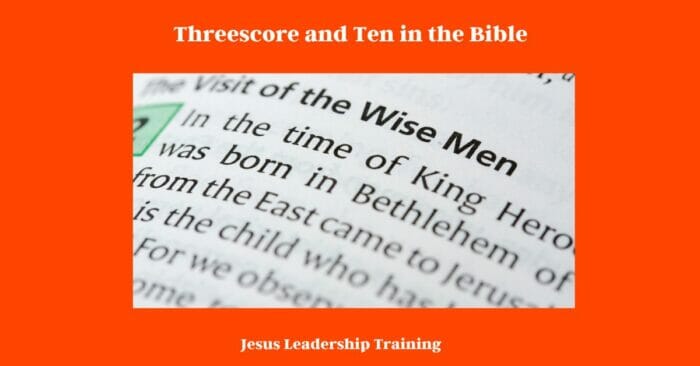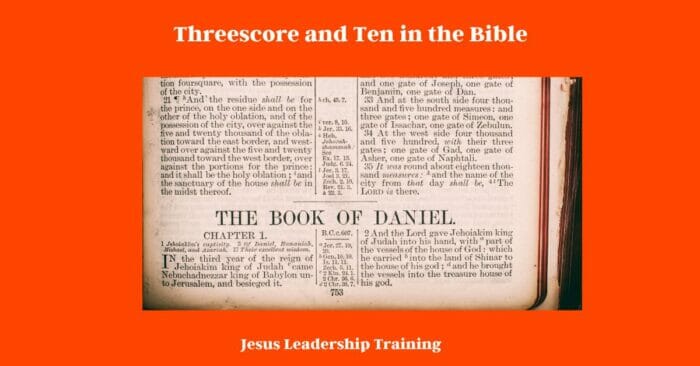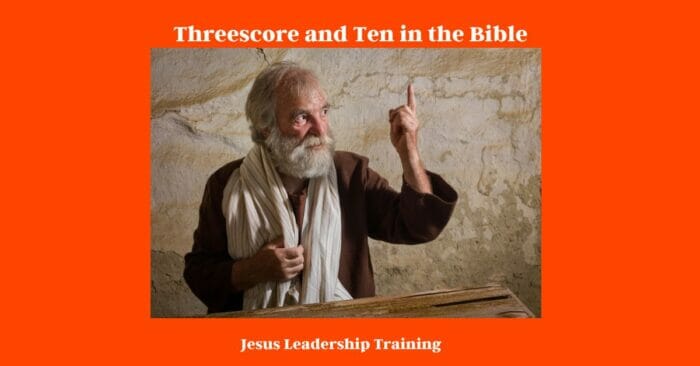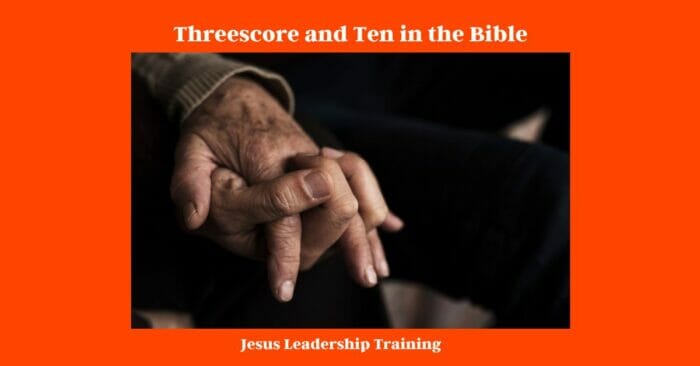3 Score and 10 – “The days of our years are threescore years and ten, and if by reason of strength (strength Labour) they are fourscore years, yet is their strength labor and sorrow; for it is soon cut off, and we fly away.” (Years of our Life) The phrase “3 score and 10” is believed to have originated in the bible and was used to refer to the lifespan of a person, which was traditionally 70 years. It is still used today to refer to something that has lasted a long time, or something that has been around for a long time. The phrase is also sometimes used to refer to the passing of a long period of time or the passing of a person’s life. For instance, when someone passes away, they might be said to have “passed on to their 3 score and 10.”
Table of Contents
What does 3 Score and 10 |Threescore and Ten in the Bible Mean?
When used in the bible a score is 20 years, threescore would be 60 years, and fourscore would be 80 years. So threescore and ten in the bible mean 70 years old.
Bible Verses Mentioning ThreeScore and Ten are:
- Gen 46:27
- Gen 50:3
- Ex 15:27
- Num 33.0
- Deut 10:22
- Jud 1:7
- Judges 8:30
- Judges 9:2,4,5,24
- Judges 12:14
- I sam 6:19
- 1 Kings 5:15
- 1 Chron 1:5
- 2 Chron 2:2,18
- 2 Chron 29:22
- 2 Chron 36:21
- Psalm 90:21
- Zech 1:12
- Acts 23:23

Bible Ages of Death of Patriarchs Adam – Abraham
- Adam: According to Genesis 5:5, Adam lived to be 930 years old.
- Seth: According to Genesis 5:8, Seth also lived to be 912 years old.
- Enosh: According to Genesis 5:11, Enosh lived to be 905 years old.
- Kenan: According to Genesis 5:14, Kenan lived to be 910 years old.
- Mahalalel: According to Genesis 5:17, Mahalalel lived to be 895 years old.
- Jared: According to Genesis 5:20, Jared lived to be 962 years old.
- Enoch: According to Genesis 5:23, Enoch lived to be 365 years old.
- Methuselah: According to Genesis 5:27, Methuselah lived to be 969 years old.
- Lamech: According to Genesis 5:31, Lamech lived to be 777 years old.
- Noah: According to Genesis 9:29, Noah lived to be 950 years old.
- Shem: According to Genesis 11:10, Shem lived to be 600 years old.
- Arphaxad: According to Genesis 11:12-13, Arphaxad lived to be 438 years old.
- Cainan: According to Genesis 11:14-17, Cainan lived to be 460 years old.
- Salah: According to Genesis 11:18-19, Salah lived to be 433 years old.
- Eber: According to Genesis 11:21-24, Eber lived to be 464 years old.
- Peleg: According to Genesis 11:25-27, Peleg lived to be 239 years old.
- Reu: According to Genesis 11:20-31, Reu lived to be 239 years old.
- Serug: According to Genesis 11:32-34, Serug lived to be 230 years old.
- Nahor: According to Genesis 11:25-32, Nahor lived to be 148 years old.
- Terah: According to Genesis 11:32, Terah lived to be 205 years old.
- Abraham: According to Genesis 25:7, Abraham lived to be 175 years old.
The 4 Meanings lf Threescore and Ten (Seventy)
- Length of Life (Average Lifespan)
- 70 Disciples
- 70 Weeks
- Seventy Years
- Seventy Elders
The Term Threescore and ten has been described in Biblical phrases as:
- Years of age
- period of life
- life of man
- Person’s life
- term of human life
- term of life
Three Score and 10 in Hebrew is:
Shibim – Seventy
Three Score and 10 in Greek is:
Hebdomekonta – Seventy
Threescore and Ten in the Bible: The Meaning of Life? (Nominal span of a human life)
In the Bible, there are many numbers that are significant. One of those numbers is threescore and ten, which appears several times throughout Scripture. But what does this number mean? Let’s take a look at some of the places it appears in the Bible and what we can learn from them.
Threescore and Ten in Psalms
One of the most well-known places threescore and ten appears in Scripture is in Psalm 90. In this Psalm, Moses reflects on the brevity of life and how fleeting our time on earth really is. He writes, “The days of our lives are threescore years and ten; and if by reason of strength they be fourscore years, yet is their strength labor and sorrow; for it is soon cut off, and we fly away” (Psalm 90:10).
From this, we see that even though our life on earth may be long, it is still short when compared to eternity. And when we understand that, it should cause us to live our lives differently. We should seek to use our time wisely and for God’s glory rather than our own.
Threescore and Ten in Numbers
Another place we see threescore and ten is in Numbers 4, where God gives instructions to time of Moses regarding how the Levites are to serve in the Tabernacle. We read, “Take the sum of the sons of Kohath from among the sons of Levi, after their families, by their fathers’ houses…From thirty years old up to fifty years old shall ye number them…All that enter into the host, to do service in the tabernacle of meeting” (Numbers 4:2-3, 23).
Lifespans in Todays Major Countries
- United States: The average lifespan in the United States is 78.7 years, with a life expectancy of 81.2 years for women and 76.1 years for men. The U.S. has experienced an overall increase in life expectancy over the last century, with a decrease in death rates from infectious diseases and an improvement in health care.
- Canada: The average lifespan in Canada is 81.3 years, with a life expectancy of 82.9 years for women and 79.5 years for men. Canada has seen steady increases in life expectancy over the last century due to improvements in healthcare and public health initiatives.
- United Kingdom: The average lifespan in the United Kingdom is 81.1 years, with a life expectancy of 83.3 years for women and 78.8 years for men. The UK has seen a steady increase in life expectancy over the last century, with a decrease in death rates from infectious diseases and an improvement in health care.
- India: The average lifespan in India is 69.7 years, with a life expectancy of 71.9 years for women and 67.5 years for men. India has experienced an overall increase in life expectancy over the last century, with a decrease in death rates from infectious diseases and an improvement in health care.
- Japan: The average lifespan in Japan is 84.2 years, with a life expectancy of 87.1 years for women and 81.3 years for men. Japan has seen a substantial increase in life expectancy over the last century, with a decrease in death rates from infectious diseases and an improvement in health care.
- China: The average lifespan in China is 76.5 years, with a life expectancy of 78.6 years for women and 74.3 years for men. China has experienced an overall increase in life expectancy over the last century, with a decrease in death rates from infectious diseases and an improvement in health care.
- Australia: The average lifespan in Australia is 82.9 years, with a life expectancy of 84.4 years for women and 81.3 years for men. Australia has seen a steady increase in life expectancy over the last century, with a decrease in death rates from infectious diseases and an improvement in health care.
So here again, we see that threescore and ten is associated with a time of service. And just as the Levites were called to serve God in a special way, so too are we called to serve him with our lives. Whether that be through our jobs, our families, or some other ministry, we are to use our time on earth to serve others and point them to Christ.
Threescore Years and Ten Are but Our Fewest Years
Lastly, I want us to consider Ecclesiastes 7:29, where Solomon says, “See now that I myself am he! There is no god besides me. I put to death and I bring to life; I have wounded and I will heal; neither is there any who can deliver out of my hand.
” And then he goes on to say in verse 8:12a, “Or ever thy days be threescore years and ten,” which is again a reference to our life span of our lives on earth. But notice what he says next: “Or ever thy days be threescore years and ten,” which is again a reference to our life span on earth. But notice what he says next: “Or ever thou hast fallen asleep…for all thy days are but as yesterday.”
In other words, Solomon is saying that even though 70 years may seem like a long time—and it is when compared to a day—in the grand scheme of things, it’s really not that long at all. Our time on earth is but a drop in the bucket compared to eternity. And so we need to make sure that we’re using our time wisely.

What Do 70 Disciples Indicate in Luke 10? (Bible Verses)
Blog Introduction: In Luke 10, Jesus sends out 70 disciples to preach the gospel throughout the regions of Judea. But what does that number signify? And why did Jesus pick 70 specifically?
There are a number of things that the number 70 could symbolize. Firstly, the number 70 is significant in Scripture as it symbolizes completeness or perfection (Genesis 2:2; Matthew 5:48). So, in sending out 70 disciples, The simple meaning Jesus may have been indicating that these were perfectly equipped men who were sent out to do His bidding.
There are a couple of different interpretations for why Jesus chose to send out 70 disciples in Luke 10. It could signify that they were perfectly equipped for the task at hand, or it could be symbolic of His later mission to preach the gospel to all the nations of the world. Regardless of which interpretation is correct, we see that Jesus had a specific purpose in mind when He selected this particular number.
The 70 Elders in the Bible: Who Were They and Why Were They Chosen?
In the Bible, we read about the 70 elders that Moses chose to help him lead the Israelites. But who were these elders? And why were they chosen? In this blog post, we’ll take a closer look at the history of the 70 elders and what their role was in leading the Israelites.
The 70 Elders in Exodus 24
The term “elders” is used to describe a group of respected leaders in many different cultures throughout history. In the Bible, the term is used to describe a group of older men who were chosen by Moses to assist him in leading the Israelites. We read about these elders in Exodus 24:1-2, where it says, “Then he said to Moses, ‘Come up to the LORD, you and Aaron, Nadab and Abihu, and seventy of the elders of Israel. You are to worship at a distance, but Moses alone is to approach the LORD.'” (Moses was a man of God)
These elders were chosen by Moses because they were men who could be trusted to help him lead the Israelites. They were men of wisdom and experience who could offer guidance and advice when needed. Furthermore, they were men who feared God and would not lead the people astray.

The Role of the 70 Elders (King James Bible)
So what was the role of the 70 elders? Essentially, they served as a council for Moses. They offered advice and guidance when needed, and they helped Moses make important decisions regarding the direction of the Israelites. Additionally, they assisted Moses in leading worship services and offering sacrifices to God.
We see an example of this in Exodus 24:9-11, where it says, “Moses went up on Mount Sinai with Aaron, Nadab and Abihu, and seventy of Israel’s elders…They saw that God was speaking with Moses as one speaks with a friend.” Here, we see that the elders were present with Moses when he met with God on Mount Sinai. They witnessed firsthand as Moses received instruction from God regarding how the Israelites should live and worship.
The 70 elders played an important role in leading the Israelites during their time in the wilderness. They were men of wisdom and experience who could offer guidance and advice when needed. Additionally, they assisted Moses in leading worship services and offering sacrifices to God. As we read about their story in Exodus 24, we can learn some important lessons about how we should live our lives today.
Daniel’s 70 Weeks – What do they mean? (King James Version of the Bible)
Blog Introduction: The 70 weeks mentioned in Daniel 9 is one of the Bible’s most difficult passages to understand. And yet, it contains some of the richest truths about God’s plan for humanity. In this blog post, we’ll take a look at what the 70 weeks actually mean and how they fit into God’s grand plan for mankind.
Daniel 9 tells us that the 70 weeks are actually divided into two periods of time. The first period is 7 weeks, which represents the time from the decree to rebuild Jerusalem until the Messiah comes. The second period is 60 weeks, which represents the time from the Messiah comes until He is cut off.
The first thing we need to understand is that these 70 weeks are not literal weeks. If we take them literally, then we would have to believe that the Messiah came exactly 49 years after the decree to rebuild Jerusalem. But history tells us that this is not the case. So what do these 70 weeks actually represent?
The answer lies in understanding that each day in the Bible represents a year (see Ezekiel 4:6). So when we apply this principle to the 70 weeks, we see that they actually represent 490 years. And this makes perfect sense when we consider all that happens during these 490 years.
First, there was the decree to rebuild Jerusalem. This took place in 445 BC, during the reign of Artaxerxes (see Ezra 7:11-26). Then, 483 years later, Jesus was born (see Matthew 2:1). And finally, 33 years after that, He was crucified (see Luke 23:33).
So when we put all of this together, we see that Daniel’s 70 weeks perfectly fit into God’s plan for humanity. They tell us exactly when Jesus would be born and when He would die. And this is just one more proof of how amazing our God truly is!
The 70 weeks mentioned in Daniel 9 are some of the most difficult verses in the Bible to understand. But despite their difficulty, they contain some of the richest truths about God’s plan for humanity. By taking a closer look at what these verses mean, we can see how they perfectly fit into God’s grand plan for mankind.
What the 70 Years in Jeremiah 25 Mean
The book of Jeremiah is a prophecy about the coming judgment of God on the nation of Israel. In chapter 25, Jeremiah speaks of a time when the people of Israel will be punished for their disobedience. This punishment will last for 70 years. But what do these 70 years mean? Let’s take a closer look.
The 70 years represent the time of Babylonian captivity. The nation of Israel had disobeyed God and as a result, they were taken captive by the Babylonians. This captivity lasted for 70 years. Jeremiah was prophesying about this event which was yet to happen.
These 70 years was also a time of chastisement or correction from God. Just as a father disciplines his son, so God was disciplining his people during this time. But this discipline was not meant to be forever. There is hope even in the midst of punishment.
After the 70 years are over, God will restore his people. He will gather them from all the nations where they have been scattered and bring them back to their homeland. This restoration is a sign of God’s great love for his people. He doesn’t forget his covenant promises even when we fail to keep our end of the bargain.
The 70 years in Jeremiah 25 represented a time of judgment and punishment for the people of Israel. But even in this time of discipline, there was hope. God promised to restore his people after the captivity was over which he did fulfilling his covenant promise to always be faithful to his people.
Final Thoughts – Threescore and Ten in the Bible
In conclusion, threescore and ten is a significant number in Scripture because it reminds us of how brief our time on earth really is. It should cause us to live differently—with an eternal perspective—and use our time wisely for God’s glory instead of our own. What area of your life do you need to start living differently? How can you begin using your time more wisely today?
God Bless Greg





